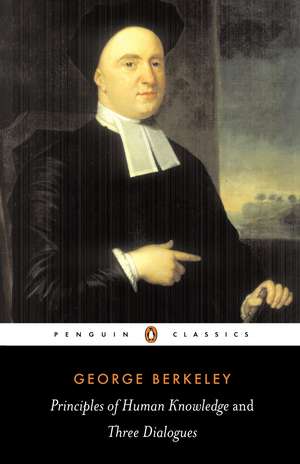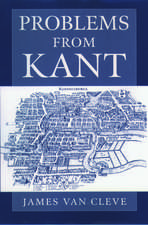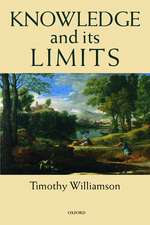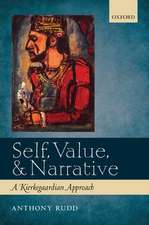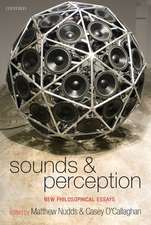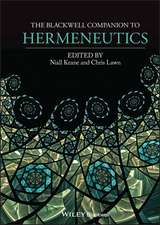Principles of Human Knowledge and Three Dialogues
Autor George Berkeley Introducere de Roger Woolhouseen Limba Engleză Paperback – 24 feb 1988
| Toate formatele și edițiile | Preț | Express |
|---|---|---|
| Paperback (2) | 48.07 lei 10-16 zile | +17.54 lei 4-10 zile |
| Oxford University Press – 26 feb 2009 | 48.07 lei 10-16 zile | +17.54 lei 4-10 zile |
| Penguin Books – 24 feb 1988 | 57.52 lei 24-35 zile | +19.36 lei 4-10 zile |
Preț: 57.52 lei
Preț vechi: 69.22 lei
-17% Nou
Puncte Express: 86
Preț estimativ în valută:
11.01€ • 11.45$ • 9.09£
11.01€ • 11.45$ • 9.09£
Carte disponibilă
Livrare economică 28 martie-08 aprilie
Livrare express 08-14 martie pentru 29.35 lei
Preluare comenzi: 021 569.72.76
Specificații
ISBN-13: 9780140432930
ISBN-10: 0140432930
Pagini: 240
Dimensiuni: 129 x 198 x 14 mm
Greutate: 0.19 kg
Editura: Penguin Books
Colecția Penguin Classics
Locul publicării:London, United Kingdom
ISBN-10: 0140432930
Pagini: 240
Dimensiuni: 129 x 198 x 14 mm
Greutate: 0.19 kg
Editura: Penguin Books
Colecția Penguin Classics
Locul publicării:London, United Kingdom
Notă biografică
Bishop
Berkeley
(1685-1753)
was
one
of
the
greatest
British
philosophers.
Roger Woolhouse Roger Woolhouse is a Professor in the Philosophy Department at York University. He has written extensively about philosophy in the seventeenth and eighteenth centuries - mainly focusing on metaphysics and the philosophy of science. He is currently working on Leibniz and on Spinoza.
Roger Woolhouse Roger Woolhouse is a Professor in the Philosophy Department at York University. He has written extensively about philosophy in the seventeenth and eighteenth centuries - mainly focusing on metaphysics and the philosophy of science. He is currently working on Leibniz and on Spinoza.
Cuprins
Principles of Human Knowledge/Three Dialogues
" cellpadding="0" cellspacing="5" border="0"Introduction
Textual Note
Notes
Principles of Human Knowledge
Three Dialogues between Hylas and Philonous First Dialogue Second Dialogue Third Dialogue Notes Select Bibliography Bibliography of Further Reading
Descriere
Descriere de la o altă ediție sau format:
Berkeley's idealism started a revolution in philosophy. As one of the great empiricist thinkers he not only influenced British philosophers from Hume to Russell and the logical positivists in the twentieth century, he also set the scene for the continental idealism of Hegel and even the philosophy of Marx.There has never been such a radical critique of common sense and perception as that given in Berkeley's Principles of Human Knowledge (1710). His views were met with disfavour, and his response to his critics was the Three Dialogues between Hylas and Philonous.This edition of Berkeley's two key works has an introduction which examines and in part defends his arguments for idealism, as well as offering a detailed analytical contents list, extensive philosophical notes and an index. ABOUT THE SERIES: For over 100 years Oxford World's Classics has made available the widest range of literature from around the globe. Each affordable volume reflects Oxford's commitment to scholarship, providing the most accurate text plus a wealth of other valuable features, including expert introductions by leading authorities, helpful notes to clarify the text, up-to-date bibliographies for further study, and much more.
Berkeley's idealism started a revolution in philosophy. As one of the great empiricist thinkers he not only influenced British philosophers from Hume to Russell and the logical positivists in the twentieth century, he also set the scene for the continental idealism of Hegel and even the philosophy of Marx.There has never been such a radical critique of common sense and perception as that given in Berkeley's Principles of Human Knowledge (1710). His views were met with disfavour, and his response to his critics was the Three Dialogues between Hylas and Philonous.This edition of Berkeley's two key works has an introduction which examines and in part defends his arguments for idealism, as well as offering a detailed analytical contents list, extensive philosophical notes and an index. ABOUT THE SERIES: For over 100 years Oxford World's Classics has made available the widest range of literature from around the globe. Each affordable volume reflects Oxford's commitment to scholarship, providing the most accurate text plus a wealth of other valuable features, including expert introductions by leading authorities, helpful notes to clarify the text, up-to-date bibliographies for further study, and much more.
Recenzii
There is something beautiful about the design of this series: their portability, even their tendency to become dog-eared. And this is a welcome reprint, sensitively edited.
the editions deserve great credit for the enthusiasm of their approach ... The introductions by eminent scholars put the thoughts of the author and the history of the time into clear perspective. Oxford should be given credit for making the classics accessible for all rather than just crib notes for students.
the editions deserve great credit for the enthusiasm of their approach ... The introductions by eminent scholars put the thoughts of the author and the history of the time into clear perspective. Oxford should be given credit for making the classics accessible for all rather than just crib notes for students.
